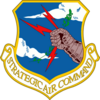366th Bombardment Squadron
This article includes a list of references, related reading, or external links, but its sources remain unclear because it lacks inline citations. (December 2012) |
| 366th Bombardment Squadron | |
|---|---|
 Emblem of the 366th Bombardment Squadron | |
| Active | 1942-1946; 1947-1948; 1951-1970 |
| Country | United States |
| Branch | United States Air Force |
| Type | Bombardment |

The 366th Bombardment Squadron is an inactive United States Air Force unit. Its last assignment was as part of the 305th Bombardment Wing, stationed at Grissom Air Force Base, Indiana.
It was inactivated on 1 January 1970.
History
Established in June 1942 as a B-17 Flying Fortress heavy bombardment squadron, the squadron trained under the Second Air Force; it deployed to the European Theater of Operations (ETO) in September 1942, being assigned to VIII Bomber Command in England. It began flying long-range strategic bombardment missions on 17 November 1942 and attacked such targets as submarine pens, docks, harbours, shipyards, motor works and marshalling yards in France, Germany and the Low Countries. It continued attacks on enemy cities, manufacturing centers, transportation links and other targets until the German capitulation in May 1945.
After combat missions ended, the squadron moved to St Trond Air Base in Belgium in July, 1945 where it conducted photo-mapping and intelligence-gathering flights called Project 'Casey Jones' over Europe and North Africa. On 15 December 1945, it moved to Lechfeld Airfield, Germany which it had bombed on 18 March 1944 and now used as an occupation base. The squadron was inactivated on December 1946 in Germany.
The squadron was reactivated under Strategic Air Command (SAC) in 1951 with B-47A (later B) Stratojet medium jet bombers. It began flying operational strategic bombardment and refueling missions from MacDill AFB, Florida. In 1955, SAC upgraded the squadron to the B-47E, the major production version of the Stratojet. The squadron, still with B-47s, was reassigned to Bunker Hill AFB, Indiana in May 1959. In September 1960, it upgraded to the B-58 Hustler supersonic medium bomber and was declared operationally ready in August 1962.
It began phasing down B-58 operations in 1969, and was inactivated in January 1970.
Lineage
- Constituted 366th Bombardment Squadron (Heavy) on 28 Jun 1942
- Activated on 1 Mar 1942
- Inactivated on 25 Dec 1946
- Redesignated 366th Bombardment Squadron (Very Heavy) on 11 Jun 1947
- Activated on 1 Jul 1947
- Inactivated on 6 Sep 1948
- Redesignated 366th Bombardment Squadron (Medium) on 20 Dec 1950
- Activated on 2 Jan 1951
- Inactivated on 1 Jan 1970
Assignments
- 305th Bombardment Group, 1 Mar 1942 – 25 Dec 1946; 1 Jul 1947-6 Sep 1948; 2 Jan 1951
- 305th Bombardment Wing, 16 Jun 1952 – 1 Jan 1970
Stations
|
|
Aircraft
- B-17 Flying Fortress, 1942–1946
- B-18 Bolo, 1942
- B-24 Liberator, 1942
- B-29 Superfortress, 1951
- B-47 Stratojet, 1952-1960
- B-58 Hustler, 1960-1970
References
![]() This article incorporates public domain material from the Air Force Historical Research Agency
This article incorporates public domain material from the Air Force Historical Research Agency
- Maurer, Maurer, ed. (1982) [1969]. Combat Squadrons of the Air Force, World War II (PDF) (reprint ed.). Washington, DC: Office of Air Force History. ISBN 0-405-12194-6. LCCN 70605402. OCLC 72556.

